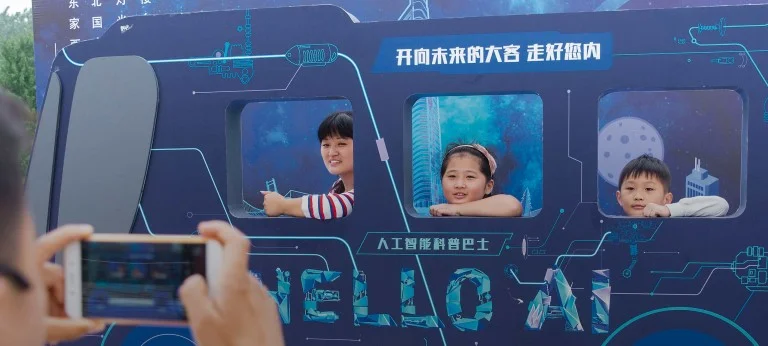Innovations from the field of Artificial Intelligence (AI) are widely considered to be the driving force for the next wave of social changes, industrial revolution, and a scientific paradigm shift. The general public, policymakers, and even researchers themselves around the world are still catching up to understand the objects and consequences of these innovations, while discourse about AI governance focuses on its ontological statutes, benefits and risk assessment, and regulatory frameworks. At the same time, media coverage as well as AI strategies and policies focus on alleviating public distrust and easing fears.

People taking photo with a bus-shaped prop stating “Wishing you a pleasant journey on the bus to the future: Hello AI." Source: Cheng Jiabei.
China, the EU and the US are not only at the forefront of research and the development of AI, but also forerunners in exploring how best to govern AI. At a time of geopolitical rifts and systemic competitions, this project investigates how and why emerging AI governance regimes in these three contexts converge and diverge. It does so by systematically examining the institutions, actors and discourses that are driving AI governance with conceptual and methodological tools from Science and Technology Studies (STS) and Science Communications (SciComm). At the institutional level, it studies how governments, industry, and media interact with science in producing knowledge of AI governance. Additionally, it maps out the the most influential actors who shape how we understand AI governance mechanisms and in the policy arena, it investigates the private sector, academia as well as the public sphere from the three contexts and shows how they communicate and negotiate domestically and internationally. At the discursive level, it traces the similarities and differences in the co-constitution of AI as a scientific field with political identities, ideas of national sovereignty, and scientific internationalism as well as the envisioned sociotechnical futures of AI in the three contexts. The empirical work draws on qualitative documents, discourse and content analysis, expert interviews, as well as quantitative network analysis and scientometrics, with an aim to bridge and enrich the conversations between STS and SciComm and to find new ways to explore new and old research questions.

